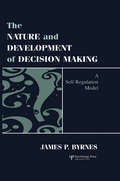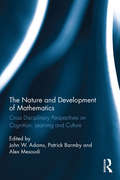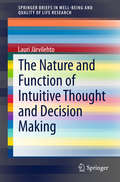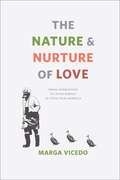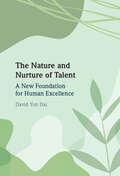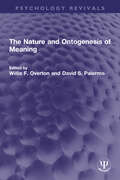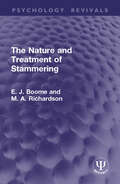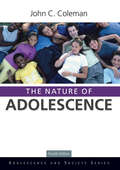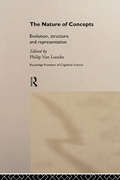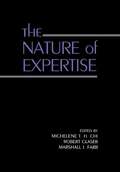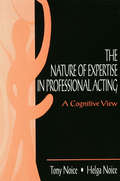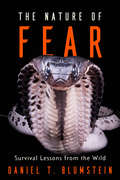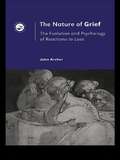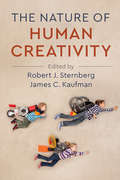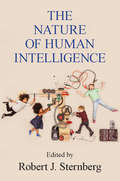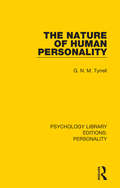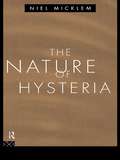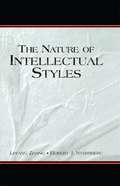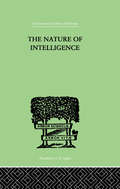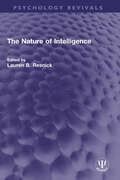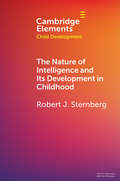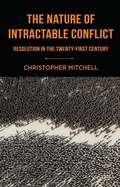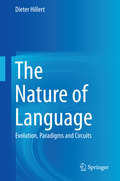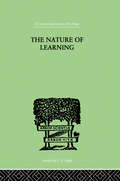- Table View
- List View
The Nature and Development of Decision-making: A Self-regulation Model
by James P. ByrnesAlthough everyone has goals, only some people successfully attain their respective goals on a regular basis. With this in mind, the author attempts to answer the question of why some people are more successful than others. He begins with the assumption that the key to personal success is effective decision-making, and then utilizes his own theory--The Self-Regulation Model--to explain the origin and nature of individual differences in decision-making competence. The author also summarizes a number of existing models of decision-making and risk-taking. This book has two primary goals: * to provide a comprehensive review of the developmental literature on the decision-making skills of children, adolescents, and adults, and * to propose a theoretical model of decision-making skill that offers a better description of this skill than prior accounts. Taken together, the literature review and theoretical model help the reader acquire a clear sense of the development of decision-making skills as well as reasons for the developmental differences that seem to emerge.
The Nature and Development of Mathematics: Cross Disciplinary Perspectives on Cognition, Learning and Culture
by John Adams Alex Mesoudi Patrick BarmbyFrom an infant’s first grasp of quantity to Einstein’s theory of relativity, the human experience of number has intrigued researchers for centuries. Numeracy and mathematics have played fundamental roles in the development of societies and civilisations, and yet there is an essential mystery to these concepts, evidenced by the fear many people still feel when confronted by apparently simple sums. Including perspectives from anthropology, education and psychology, The Nature and Development of Mathematics addresses three core questions: Is maths natural? What is the impact of our culture and environment on mathematical thinking? And how can we improve our mathematical ability? Examining the cognitive processes that we use, the origins of these skills and their cultural context, and how learning and teaching can be supported in the classroom, the book contextualises each issue within the wider field, arguing that only by taking a cross-disciplinary perspective can we fully understand what it means to be numerate, as well as how we become numerate in our modern world. This is a unique collection including contributions from a range of renowned international researchers. It will be of interest to students and researchers across cognitive psychology, cultural anthropology and educational research.
The Nature and Function of Intuitive Thought and Decision Making
by Lauri JärvilehtoThis book focuses on the very nature and function of intuitive thought. It presents an up-to-date scientific model on how the non-conscious and intuitive thought processes work in human beings. The model is based on mainstream theorizing on intuition, as well as qualitative meta-analysis of the empirical data available in the research literature. It combines recent work in the fields of philosophy of mind, cognitive psychology and positive psychology. While systematic research in intuition is relatively new, there is an abundance of positions advocating more or less imaginative ideas of what intuition is about, ranging from quantum mechanical phenomena to new age ideologies. Research in the past few decades, in particular by proponents of the dual processing theory of thought such as Daniel Kahneman and Jonathan Evans, offers powerful tools to address and evaluate the question of intuition without the need to resort to spiritual entities. Within the framework of the dual processing theory, backed up by findings in positive psychology, intuition turns out to be the capacity to carry out complex cognitive operations within a specific domain of operations familiar to the agent.
The Nature and Nurture of Love: From Imprinting to Attachment in Cold War America
by Marga VicedoThe notion that maternal care and love will determine a childOCOs emotional well-being and future personality has become ubiquitous. In countless stories and movies we find that the problems of the protagonistsOCoanything from the fear of romantic commitment to serial killingOCostem from their troubled relationships with their mothers during childhood. How did we come to hold these views about the determinant power of mother love over an individualOCOs emotional development? And what does this vision of mother love entail for children and mothers?aaaaaaaaaaaIn "The Nature and Nurture of Love," Marga Vicedo examines scientific views about childrenOCOs emotional needs and mother love from World War II until the 1970s, paying particular attention to John BowlbyOCOs ethological theory of attachment behavior. Vicedo tracks the development of BowlbyOCOs work as well as the interdisciplinary research that he used to support his theory, including Konrad LorenzOCOs studies of imprinting in geese, Harry HarlowOCOs experiments with monkeys, and Mary AinsworthOCOs observations of children and mothers in Uganda and the United States. VicedoOCOs historical analysis reveals that important psychoanalysts and animal researchers opposed the project of turning emotions into biological instincts. Despite those criticisms, she argues that attachment theory was paramount in turning mother love into a biological need. This shift introduced a new justification for the prescriptive role of biology in human affairs and had profoundOCoand negativeOCoconsequences for mothers and for the valuation of mother love.
The Nature and Nurture of Talent: A New Foundation for Human Excellence
by David Yun DaiPrepare for a captivating journey into the depths of human potential and excellence in this scholarly work. Within these pages, discover evolving complexity theory (ECT), a unified theory of talent development that integrates a rich body of research and explores a wide array of talent-related phenomena. This theory challenges conventional wisdom, shifting the focus from genetics and environmental factors to the dynamic interplay of self-organized development and real-time person–environment interactions. This book provides a practical roadmap, emphasizing actions over genetic determinants, guiding readers toward the attainment of higher levels of excellence. Departing from traditional perspectives, Dr. Dai envisions human development as a self-organized journey toward higher coherence, reframing talent development as active participation in sociocultural activities from which one's individuality evolves, and directions and purposes are crystalized. Written in an engaging and narrative style, this work is essential reading for researchers, students, and professionals seeking a deeper understanding of human potential.
The Nature and Ontogenesis of Meaning (Psychology Revivals)
by Willis F. Overton David S. PalermoThroughout its evolution, Piaget's theory has placed meaning at the center of all attempts to understand the nature and development of knowing. For Piaget, all knowing – whether sensorimotor, representational, or reasoned, and whether directed toward successful problem solutions or toward general understanding – is necessarily a construction which arises out of meaning making activity. It was in this context that the editors of this volume, originally published in 1994, approached the board of directors of the Jean Piaget Society with a proposal to organize a recent annual symposium around the topic of the nature and development of meaning. In forming this symposium and in moving from symposium to integrated text, the editors wanted to insure both a breadth and depth to the analysis of the topic. Addressing philosophical, theoretical, and empirical perspectives, this issue-oriented volume provides an integrated exploration of the current understanding of the nature and development of meaning. Contemporary issues that frame alternative understandings of the nature of meaning – nativist vs. constructivist positions, and computational vs. embodied mind contexts – are examined as they impact on the investigation of meaning. Comparative, cognitive, and linguistic developmental dimensions of meaning are described and discussed.
The Nature and Origins of Mass Opinion
by John R. ZallerIn this 1992 book John Zaller develops a comprehensive theory to explain how people acquire political information from elites and the mass media and convert it into political preferences. Using numerous specific examples, Zaller applies this theory to the dynamics of public opinion on a broad range of subjects, including domestic and foreign policy, trust in government, racial equality, and presidential approval, as well as voting behaviour in U. S. House, Senate, and presidential elections. The thoery is constructed from four basic premises. The first is that individuals differ substantially in their attention to politics and therefore in their exposure to elite sources of political information. The second is that people react critically to political communication only to the extent that they are knowledgeable about political affairs. The third is that people rarely have fixed attitudes on specific issues; rather, they construct 'preference statements' on the fly as they confront each issue raised. The fourth is that, in constructing these statements, people make the greatest use of ideas that are, for various reasons, the most immediately salient to them. Zaller emphasizes the role of political elites in establishing the terms of political discourse in the mass media and the powerful effect of this framing of issues on the dynamics of mass opinion on any given issue over time.
The Nature and Treatment of Stammering (Psychology Revivals)
by E. J. Boome M. A. RichardsonFirst published in 1931, The Nature and Treatment of Stammering looks at the theories and causes of stammering as they were understood at the time. It looks at the various treatments available, exposing those ‘quack’ remedies that are unlikely to work and may make things worse. Then goes on to describe new treatments with proven successful outcomes. Today it can be read in its historical context.This book is a re-issue originally published in 1931. The language used is a reflection of its era and no offence is meant by the Publishers to any reader by this re-publication.
The Nature of Adolescence (Adolescence and Society)
by John C. ColemanThe fourth edition of this successful textbook provides an up-to-date introduction to all of the key features of adolescent development. While drawing on the North American literature on adolescence, it highlights European perspectives and also provides unique coverage of the topic by summarising and reviewing what is known about adolescence from a British viewpoint. Comprehensively updated and rewritten, this edition includes material on new topics such as: The development of the adolescent brain Sleep patterns in adolescence Parenting programmes for parents of teenagers Health, including sport and exercise, nutrition and obesity, and mental health Education and schooling Young people’s use of digital technologies New approaches to resilience and coping. The book places a particular emphasis on a positive view of adolescence, and the author develops a new theoretical perspective which looks at how young people themselves construct and shape their own developmental pathways. Interview material taken from discussions with adolescents is included throughout the book, and there are sample essay questions and PowerPoint lecture slides available online. This is an essential text for anyone studying human development at undergraduate and postgraduate level, as well as on postgraduate courses for professionals including teachers, social workers, health workers, counsellors, and youth workers.
The Nature of Concepts: Evolution, Structure and Representation (Frontiers of Cognitive Science #Vol. 2)
by Philip Van LoockeThe Nature of Concepts examines a central issue for all the main disciplines in cognitive science: how the human mind creates and passes on to other human minds a concept. An excellent cross-disciplinary collection with contributors including Steven Pinker, Andy Clarke and Henry Plotkin.
The Nature of Expertise
by Robert Glaser Michelene T.H. Chi M. J. FarrDue largely to developments made in artificial intelligence and cognitive psychology during the past two decades, expertise has become an important subject for scholarly investigations. The Nature of Expertise displays the variety of domains and human activities to which the study of expertise has been applied, and reflects growing attention on learning and the acquisition of expertise. Applying approaches influenced by such disciplines as cognitive psychology, artificial intelligence, and cognitive science, the contributors discuss those conditions that enhance and those that limit the development of high levels of cognitive skill.
The Nature of Expertise in Professional Acting: A Cognitive View (Expertise: Research and Applications Series)
by Helga NoiceFor nearly 25 years, expertise has been considered an important testing ground for theories of cognition. Cognitive scientists have examined experts as diverse as chess masters, waiters, field-hockey players, and computer programmers. Recently, increased attention has been given to the arts, including dance, music appreciation and performance, and literary analysis. It is therefore somewhat surprising that--except for the authors' program of research dating from the late 1980s--virtually no studies on the cognitive processes of professional actors can be found in the literature. These experts not only routinely memorize hours of verbal material in a very short time, but they retrieve it verbatim along with the accompanying gestures, movements, thoughts, and emotions of the characters. The mental processes involved in this task constitute the subject of this recent research and are described in detail in this book.
The Nature of Fear: Survival Lessons From The Wild
by Daniel T. BlumsteinA leading expert in animal behavior takes us into the wild to better understand and manage our fears.Fear, honed by millions of years of natural selection, kept our ancestors alive. Whether by slithering away, curling up in a ball, or standing still in the presence of a predator, humans and other animals have evolved complex behaviors in order to survive the hazards the world presents. But, despite our evolutionary endurance, we still have much to learn about how to manage our response to danger.For more than thirty years, Daniel Blumstein has been studying animals’ fear responses. His observations lead to a firm conclusion: fear preserves security, but at great cost. A foraging flock of birds expends valuable energy by quickly taking flight when a raptor appears. And though the birds might successfully escape, they leave their food source behind. Giant clams protect their valuable tissue by retracting their mantles and closing their shells when a shadow passes overhead, but then they are unable to photosynthesize, losing the capacity to grow. Among humans, fear is often an understandable and justifiable response to sources of threat, but it can exact a high toll on health and productivity.Delving into the evolutionary origins and ecological contexts of fear across species, The Nature of Fear considers what we can learn from our fellow animals—from successes and failures. By observing how animals leverage alarm to their advantage, we can develop new strategies for facing risks without panic.
The Nature of Grief: The Evolution and Psychology of Reactions to Loss
by John ArcherThe Nature of Grief is a provocative new study on the evolution of grief. Most literature on the topic regards grief either as a psychiatric disorder or illness to be cured. In contrast to this, John Archer shows that grief is a natural reaction to losses of many sorts, even to the death of a pet, and he proves this by bringing together material from evolutionary psychology, ethology and experimental psychology.This innovative new work will be required reading for developmental and clinical psychologists and all those in the caring professions.
The Nature of Human Creativity
by Robert J. Sternberg James C. KaufmanThis book provides an overview of the approaches of leading scholars to understanding the nature of creativity, its measurement, its investigation, its development, and its importance to society. <P><P>The authors are the twenty-four psychological scientists who are most frequently cited in the four major textbooks on creativity, and they can thus be considered among the most eminent living scholars in the field. <P>Authors discuss how they define creativity, the kinds of questions they have addressed, theories they have proposed, and a description of their research and the most interesting empirical results it has produced. The chapters represent a wide range of substantive and methodological emphases, including psychometric, cognitive, expertise-based, developmental, neuropsychological, cultural, systems, and group-difference approaches. <P>The Nature of Human Creativity brings together an incredible diversity of viewpoints, helping students and researchers to see the points of consensus as well as the differences in contemporary perspectives.<P>The authors are the most commonly cited in the major texts in the field, allowing readers to learn from the research of the leaders in the field.<P> Each chapter author answers a standardized list of questions, making the volume easy to navigate.<P> A wide variety of approaches to human creativity are presented, helping readers to see the points of consensus and differences in perspective within the field.
The Nature of Human Intelligence: The Impact Of Tools On The Nature And Development Of Human Abilities (Educational Psychology Ser.)
by Robert J. SternbergThe study of human intelligence features many points of consensus, but there are also many different perspectives. In this unique book Robert J. Sternberg invites the nineteen most highly cited psychological scientists in the leading textbooks on human intelligence to share their research programs and findings. Each chapter answers a standardized set of questions on the measurement, investigation, and development of intelligence - and the outcome represents a wide range of substantive and methodological emphases including psychometric, cognitive, expertise-based, developmental, neuropsychological, genetic, cultural, systems, and group-difference approaches. This is an exciting and valuable course book for upper-level students to learn from the originators of the key contemporary ideas in intelligence research about how they think about their work and about the field.
The Nature of Human Personality (Psychology Library Editions: Personality)
by G. N. TyrrellFor over thirty years G. N. M. Tyrrell devoted himself to the study of psychical phenomena. Originally published in 1954, in his last book, written just before his death, he probes as deeply as possible into the meaning of the results of psychical research. He believes that paranormal phenomena are not isolated occurrences due to the exceptional gifts of a few unusual persons but the result of capacities which all human beings possess, though in widely varying degrees. After an introductory chapter on Psychology and Psychiatry, the chief psychical phenomena – extra-sensory perception, mediumship, apparitions, etc. – are discussed and illustrated. Then follows a general criticism of current attitudes towards the subject. The book ends with two chapters arguing that the normal and paranormal are one and suggesting a pathway to religion.
The Nature of Hysteria
by Niel MicklemHysteria was a frequently diagnosed illness in the West through the nineteenth and much of the twentieth century. Today the medical profession has virtually abandoned the diagnosis altogether. However, this does not mean that hysteria has ceased to exist. In The Nature of Hysteria, Niel Micklem argues that the disease has merely shifted into other personal and collective forms. He traces the history of hysteria from ancient Egyptian times to the present and examines its mythic background. He also describes the involvement of sexuality in the clinical manifestations of hysteria to witchcraft, and various collective manifestations of hysteria in the form of sexual permissiveness and unisexual behaviour. Arguing that hysteria is much more than an illness, Niel Micklem suggests that the denial of hysteria in individual patients has coincided with the creation of an increasingly hysterical society.
The Nature of Intellectual Styles (Educational Psychology Series)
by Robert J. Sternberg Li-fang ZhangThis book provides an up-to-date, panoramic picture of the field of intellectual styles through describing, analyzing, and integrating the major theoretical and research works on the topic. Readers will gain a broad understanding of the field--its nature, origins, historical development, theories, research, and applications, as well as the interrelationships among major theoretical constructs proposed by different theorists in the past few decades. In particular, three major controversial issues in the field are addressed by both empirical findings and literature review: styles as better versus worse or as equal in merit; styles as traits versus styles as states; and styles as different constructs versus styles as similar constructs with different style labels.Educators will find ideas on how to improve their teaching and assessment of student performance. Student development specialists will be interested in the book because intellectual styles, as evidenced by recent studies, play a critical role in many aspects of student development including cognitive, affective, psychosocial, and career development. Psychologists will gain an understanding of an important facet of the field at the interface between cognition and personality. Managers in business will find the book relevant to such issues as effective supervision and staff training and development. The Nature of Intellectual Styles is intended for anyone--particularly researchers and students in the fields of education, psychology, and business management--who is interested in understanding intellectual styles and their effects on daily life.
The Nature of Intelligence (International Library Of Psychology Ser.)
by Thurstone, L LFirst Published in 1999. Routledge is an imprint of Taylor & Francis, an informa company.
The Nature of Intelligence (Psychology Revivals)
by Lauren B. ResnickIn the 1960s and early 1970s, converging scientific and social movements had generated increasing concern over the meaning of the term intelligence. Traditional definitions, rooted in the history of intelligence testing and school selection practices, had come under challenge as experimental psychology turned increasingly to the study of human cognitive processes and as understanding of the influence of culture on patterns of thinking grew.Originally published in 1976, the theme of the book is an examination of cognitive and adaptive processes involved in intelligent behavior and a look at how these processes might be related to tested intelligence. The book contains sections on intelligence from the psychometric viewpoint, computer simulations of intelligent behavior, studies of intelligence as social and biological adaptation, and intelligence analyzed in terms of basic cognitive processes. In a number of the chapters the constructs and methods of modern information-processing psychology are used in their analyses of intelligence. As the reader will discover, the divisions of the book do not necessarily represent competing viewpoints, but rather multiple windows on the phenomenon of human intelligence. Today it can be read and enjoyed in its historical context.
The Nature of Intelligence and Its Development in Childhood (Elements in Child Development)
by Robert J. SternbergIn this Element, I first introduce intelligence in terms of historical definitions. I show that intelligence, as conceived even by the originators of the first intelligence tests, Alfred Binet and David Wechsler, is a much broader construct than just scores on narrow tests of intelligence and their proxies. I then review the major approaches to understanding intelligence and its development: the psychometric (test-based), cognitive and neurocognitive (intelligence as a set of brain-based cognitive representations and processes), systems, cultural, and developmental. These approaches, taken together, present a much more complex portrait of intelligence and its development than the one that would be ascertained just from scores on intelligence tests. Finally, I draw some take-away conclusions.
The Nature of Intractable Conflict
by Christopher MitchellBuilding upon Mitchell's earlier work, The Structure of International Conflict, this volume surveys the field of conflict analysis and resolution in the twenty-first century, exploring the methods which people have sought to mitigate destructive processes including the creative and innovative new ways of resolving insoluble disputes.
The Nature of Language
by Dieter HillertThe Nature of Language addresses one of the most fundamental questions of mankind: how did language evolve, and what are the neurobiological and cognitive foundations of language processing? These questions are explored from different perspectives to discuss the building blocks of language evolution and how they developed in the way they can be found in modern humans. Primarily, neural mapping methods of cognition presented in this research provide extremely valuable data about the neural circuitries that are involved in language processing. Thus, the book explores and illustrates cortical mapping in typical language patterns, but also cortical mapping in atypical populations that fail to process particular language aspects. A neurobiological stance is used to inquire about how language abilities of our species evolved to communicate for the purposes of conveying information such as ideas, emotions, goals, and humor. The evolutionary language model presented builds on the cognitive abilities of our ancestors, and it allows readers to draw a variety of expansive conclusions from that, including the idea that human language as an interface system provides the basis for consciousness.
The Nature of Learning: In Its Relation to the Living System (International Library Of Psychology Ser. #Vol. 41)
by George HumphreyThis is Volume IV in a series of twenty-one in a collection on Cognitive Psychology. Originally published in 1933, this looks at the nature of learning in its relation to the living system. In order to discover the mechanism of the living system, itis necessary to investigate which among its effects are connected with well-established laws of chemistry and physics and to distinguish them carefully from the effects which have no immediate, or at least known, relation with these laws, and of which the cause is concealed for us.
